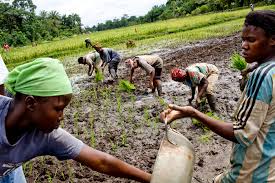FAO is helping Cote d’Ivoire “rethink” its cereal supply scheme, reports said on Friday.
The Food and Agriculture Organization of the United Nations (FAO) office in Abidjan initiated, on Friday, March 11, a workshop on the evaluation of food systems in Cote d’Ivoire in the context of Russia’s Ukraine war that is affecting commodity prices.
The meeting gathered state actors, researchers, civil society and development partners.
Ms. Viviane Gossan Coulibaly, representing the Minister, Secretary General of the Presidency of the Republic of Cote d’Ivoire, Abdourahmane Cisse, opened the workshop. She welcomed this assessment of the country’s food systems with support from the European Union.
Samy Gaiji, the FAO Representative in Cote d’Ivoire said that this general consultation aims to look back at the country’s food systems throughout the chain, from producers to consumers.
Cote d’Ivoire, he said, is “very dependent on grain imports. Today, prices per ton are 420 euros, an increase of more than 100 percent a year ago. And this is because of the Ukraine-Russia war.”
Therefore, this workshop should allow “rethinking the mode of procurement of cereals,” by developing among others, millet, sorghum, cowpea, continued Mr. Gaiji.
He recalled that since the 1980s, Cote d’Ivoire has been dependent on imports, which exposes the state to fluctuations in the price of raw materials that have soared following the health crisis of Covid-19.
“We have an estimate of 60 to 80 percent of national consumption based on imports,” he said, noting that for rice and tilapia, “the figures have fluctuated between 600 billion CFA francs or more of debt” because of their imports.
For him, the country must work on its food sovereignty through the availability of food and their affordable costs. This debate is carried with the European Union, which funds projects for the benefit of Cote d’Ivoire.
“For example, it is logical to reach a level of autonomy in the production of rice and tilapia in Cote d’Ivoire up to 80 percent and we can be an exporter as we were in the 1980s for rice,” said Samy Gaiji, the FAO Representative in Cote d’Ivoire.
His colleague Mahana Zoungrana, in charge of agricultural policies at FAO-Cote d’Ivoire, noted that the difficulties are related to the mode of production which are very extinctive and which do not safeguard the forest.
He also mentioned the production, conservation, processing and food combination technologies that are not well mastered by the actors.
The assessment of Ivorian food systems was requested by the government and received financial support from the EU, technical assistance from the FAO and the ‘Centre de Cooperation Internationale en Recherche Agronomique pour le Developpement’ (CIRAD).
The results of the consultation will enrich the roadmap of Cote d’Ivoire, which has been presented as part of the World Summit on Food Systems initiated by the United Nations Secretary-General, Antonio Guterres, in September 2021 in New York.
AP/ls/fss/abj/APA


